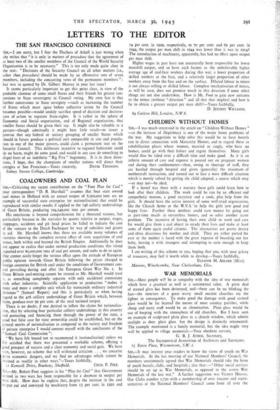THE SAN FRANCISCO CONFERENCE
LETTERS TO THE EDITOR
Snt,—I am sorry, but I fear the Duchess of Atholl is just wrong when she writes that "it is only in matters of procedure that the agreement of at least two of the smaller members of the Council of the World Security Organisation is to be necessary." This is not only made quite, clear in the text: "Decisions of the Security Council on all other matters (i.e., other than procedure) should be made by an affirmative vote of seven members, including the concurring votes of the permanent members": but was so quoted by Dr. Gilbert Murray in your last issue!
It seems particularly important to get this point clear, in view of the probable clamour of some small States and their friends for greater con- cessions to State sovereignty in Council voting. My own fear is that further concessions to State soveignty —such as increasing the, number of States which must agree before collective -action by the Council becomes possible—would unduly sacrifice speed of decision and decisive- ness of action to separate State-rights. It is rather in the sphere of Economic and Social organisation, and of Regional organisation, that smaller States should be given their say. It might also be valuable as a gesture—though admittedly it might bear little result—to insert a proviso that any federal or unitary grouping of smaller States which should in future produce a political unit comparable in size and popula- tion to one of the major powers, could claim a permanent seat on the Security Council. This deliberate incentive to regional federation could do no harm, might do some good, and would in any case do something to dispel fears of an indefinite "Big Five" hegemony. It is in these direc- tions, I hope, that the champions of smaller nations will direct their
energies at San Francisco.—Yours sincerely, DAVID THOMSON. Sidney Sussex College, Cambridge.






















 Previous page
Previous page